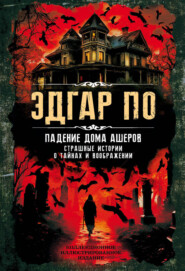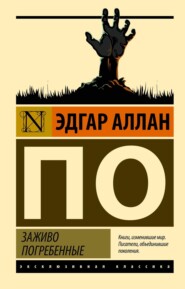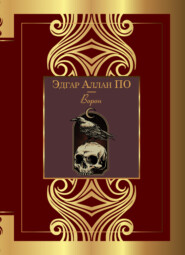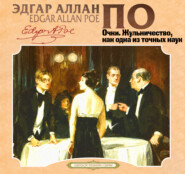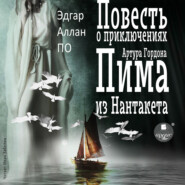По всем вопросам обращайтесь на: info@litportal.ru
(©) 2003-2024.
✖
The Complete Stories of Edgar Allan Poe
Настройки чтения
Размер шрифта
Высота строк
Поля
Mute, motionless, aghast!
For alas! alas! with me
The light of life is o’er.
“No more – no more – no more,”
(Such language holds the solemn sea
To the sands upon the shore,)
Shall bloom the thunder-blasted tree,
Or the stricken eagle soar!
Now all my hours are trances;
And all my nightly dreams
Are where the dark eye glances,
And where thy footstep gleams,
In what ethereal dances,
By what Italian streams.
Alas! for that accursed time
They bore thee o’er the billow,
From Love to titled age and crime,
And an unholy pillow —
From me, and from our misty clime,
Where weeps the silver willow!
That these lines were written in English – a language with which I had not believed their author acquainted – afforded me little matter for surprise. I was too well aware of the extent of his acquirements, and of the singular pleasure he took in concealing them from observation, to be astonished at any similar discovery; but the place of date, I must confess, occasioned me no little amazement. It had been originally written London, and afterwards carefully overscored – not, however, so effectually as to conceal the word from a scrutinizing eye. I say this occasioned me no little amazement; for I well remember that, in a former conversation with my friend, I particularly inquired if he had at any time met in London the Marchesa di Mentoni, (who for some years previous to her marriage had resided in that city,) when his answer, if I mistake not, gave me to understand that he had never visited the metropolis of Great Britain. I might as well here mention, that I have more than once heard, (without of course giving credit to a report involving so many improbabilities,) that the person of whom I speak, was not only by birth, but in education, an Englishman.
“There is one painting,” said he, without being aware of my notice of the tragedy – “there is still one painting which you have not seen.” And throwing aside a drapery, he discovered a full-length portrait of the Marchesa Aphrodite.
Human art could have done no more in the delineation of her superhuman beauty. The same ethereal figure which stood before me the preceding night upon the steps of the Ducal Palace, stood before me once again. But in the expression of the countenance, which was beaming all over with smiles, there still lurked (incomprehensible anomaly!) that fitful stain of melancholy which will ever be found inseparable from the perfection of the beautiful. Her right arm lay folded over her bosom. With her left she pointed downward to a curiously fashioned vase. One small, fairy foot, alone visible, barely touched the earth – and, scarcely discernible in the brilliant atmosphere which seemed to encircle and enshrine her loveliness, floated a pair of the most delicately imagined wings. My glance fell from the painting to the figure of my friend, and the vigorous words of Chapman’s Bussy D’Ambois quivered instinctively upon my lips:
“He is up
There like a Roman statue!
He will stand Till Death hath made him marble!”
“Come!” he said at length, turning towards a table of richly enamelled and massive silver, upon which were a few goblets fantastically stained, together with two large Etruscan vases, fashioned in the same extraordinary model as that in the foreground of the portrait, and filled with what I supposed to be Johannisberger. “Come!” he said, abruptly, “let us drink! It is early – but let us drink. It is indeed early,” he continued, musingly, as a cherub with a heavy golden hammer, made the apartment ring with the first hour after sunrise – “It is indeed early, but what matters it? let us drink! Let us pour out an offering to yon solemn sun which these gaudy lamps and censers are so eager to subdue!” And, having made me pledge him in a bumper, he swallowed in rapid succession several goblets of the wine.
“To dream,” he continued, resuming the tone of his desultory conversation, as he held up to the rich light of a censer one of the magnificent vases – “to dream has been the business of my life. I have therefore framed for myself, as you see, a bower of dreams. In the heart of Venice could I have erected a better? You behold around you, it is true, a medley of architectural embellishments. The chastity of Ionia is offended by antediluvian devices, and the sphynxes of Egypt are outstretched upon carpets of gold. Yet the effect is incongruous to the timid alone. Proprieties of place, and especially of time, are the bugbears which terrify mankind from the contemplation of the magnificent. Once I was myself a decorist; but that sublimation of folly has palled upon my soul. All this is now the fitter for my purpose. Like these arabesque censers, my spirit is writhing in fire, and the delirium of this scene is fashioning me for the wilder visions of that land of real dreams whither I am now rapidly departing.” He here paused abruptly, bent his head to his bosom, and seemed to listen to a sound which I could not hear. At length, erecting his frame, he looked upwards and ejaculated the lines of the Bishop of Chichester: —
Stay for me there! I will not fail
To meet thee in that hollow vale.
In the next instant, confessing the power of the wine, he threw himself at full length upon an ottoman.
A quick step was now heard upon the staircase, and a loud knock at the door rapidly succeeded. I was hastening to anticipate a second disturbance, when a page of Mentoni’s household burst into the room, and faltered out, in a voice choking with emotion, the incoherent words, “My mistress! – my mistress! – poisoned! – poisoned! Oh beautiful – oh beautiful Aphrodite!”
Bewildered, I flew to the ottoman, and endeavored to arouse the sleeper to a sense of the startling intelligence. But his limbs were rigid – his lips were livid – his lately beaming eyes were riveted in death. I staggered back towards the table – my hand fell upon a cracked and blackened goblet – and a consciousness of the entire and terrible truth flashed suddenly over my soul.
THE END
Four Beasts in One (1833)
Chacun a ses vertus.
Crébillon’s Xerxes.
ANTIOCHUS EPIPHANES is very generally looked upon as the Gog of the prophet Ezekiel. This honor is, however, more properly attributable to Cambyses, the son of Cyrus. And, indeed, the character of the Syrian monarch does by no means stand in need of any adventitious embellishment. His accession to the throne, or rather his usurpation of the sovereignty, a hundred and seventy-one years before the coming of Christ; his attempt to plunder the temple of Diana at Ephesus; his implacable hostility to the Jews; his pollution of the Holy of Holies; and his miserable death at Taba, after a tumultuous reign of eleven years, are circumstances of a prominent kind, and therefore more generally noticed by the historians of his time, than the impious, dastardly, cruel, silly, and whimsical achievements which make up the sum total of his private life and reputation.
Let us suppose, gentle reader, that it is now the year of the world three thousand eight hundred and thirty, and let us, for a few minutes, imagine ourselves at that most grotesque habitation of man, the remarkable city of Antioch. To be sure there were, in Syria and other countries, sixteen cities of that appellation, besides the one to which I more particularly allude. But ours is that which went by the name of Antiochia Epidaphne, from its vicinity to the little village of Daphne, where stood a temple to that divinity. It was built (although about this matter there is some dispute) by Seleucus Nicanor, the first king of the country after Alexander the Great, in memory of his father Antiochus, and became immediately the residence of the Syrian monarchy. In the flourishing times of the Roman Empire, it was the ordinary station of the prefect of the eastern provinces; and many of the emperors of the queen city, (among whom may be mentioned especially, Verus and Valens,) spent here the greater part of their time. But I perceive we have arrived at the city itself. Let us ascend this battlement, and throw our eyes upon the town and neighboring country.
“What broad and rapid river is that which forces its way, with innumerable falls, through the mountainous wilderness, and finally through the wilderness of buildings?”
That is the Orontes, and it is the only water in sight, with the exception of the Mediterranean, which stretches like a broad mirror, about twelve miles off to the southward. Every one has seen the Mediterranean; but let me tell you, there are few who have had a peep at Antioch. By few, I mean, few who, like you and me, have had, at the same time, the advantages of a modern education. Therefore cease to regard that sea, and give your whole attention to the mass of houses that lie beneath us. You will remember that it is now the year of the world three thousand eight hundred and thirty. Were it later – for example, were it the year of our Lord eighteen hundred and forty-five, we should be deprived of this extraordinary spectacle. In the nineteenth century Antioch is – that is to say, Antioch will be – in a lamentable state of decay. It will have been, by that time, totally destroyed, at three different periods, by three successive earthquakes. Indeed, to say the truth, what little of its former self may then remain, will be found in so desolate and ruinous a state that the patriarch shall have removed his residence to Damascus. This is well. I see you profit by my advice, and are making the most of your time in inspecting the premises – in– satisfying your eyes with the memorials and the things of fame that most renown this city.
I beg pardon; I had forgotten that Shakspeare will not flourish for seventeen hundred and fifty years to come. But does not the appearance of Epidaphne justify me in calling it grotesque?
“It is well fortified; and in this respect is as much indebted to nature as to art.”
Very true.
“There are a prodigious number of stately palaces.”
There are.
“And the numerous temples, sumptuous and magnificent, may bear comparison with the most lauded of antiquity.”
All this I must acknowledge. Still there is an infinity of mud huts, and abominable hovels. We cannot help perceiving abundance of filth in every kennel, and, were it not for the overpowering fumes of idolatrous incense, I have no doubt we should find a most intolerable stench. Did you ever behold streets so insufferably narrow, or houses so miraculously tall? What gloom their shadows cast upon the ground! It is well the swinging lamps in those endless colonnades are kept burning throughout the day; we should otherwise have the darkness of Egypt in the time of her desolation.
“It is certainly a strange place! What is the meaning of yonder singular building? See! it towers above all others, and lies to the eastward of what I take to be the royal palace!”
That is the new Temple of the Sun, who is adored in Syria under the title of Elah Gabalah. Hereafter a very notorious Roman Emperor will institute this worship in Rome, and thence derive a cognomen, Heliogabalus. I dare say you would like to take a peep at the divinity of the temple. You need not look up at the heavens; his Sunship is not there – at least not the Sunship adored by the Syrians. That deity will be found in the interior of yonder building. He is worshipped under the figure of a large stone pillar terminating at the summit in a cone or pyramid, whereby is denoted Fire.
“Hark! – behold! – who can those ridiculous beings be, half naked, with their faces painted, shouting and gesticulating to the rabble?”
Some few are mountebanks. Others more particularly belong to the race of philosophers. The greatest portion, however – those especially who belabor the populace with clubs – are the principal courtiers of the palace, executing as in duty bound, some laudable comicality of the king’s.
“But what have we here? Heavens! the town is swarming with wild beasts! How terrible a spectacle! – how dangerous a peculiarity!”
Terrible, if you please; but not in the least degree dangerous. Each animal, if you will take the pains to observe, is following, very quietly, in the wake of its master. Some few, to be sure, are led with a rope about the neck, but these are chiefly the lesser or timid species. The lion, the tiger, and the leopard are entirely without restraint. They have been trained without difficulty to their present profession, and attend upon their respective owners in the capacity of valets-de-chambre. It is true, there are occasions when Nature asserts her violated dominion; – but then the devouring of a man-at-arms, or the throttling of a consecrated bull, is a circumstance of too little moment to be more than hinted at in Epidaphne.
“But what extraordinary tumult do I hear? Surely this is a loud noise even for Antioch! It argues some commotion of unusual interest.”
Yes – undoubtedly. The king has ordered some novel spectacle – some gladiatorial exhibition at the Hippodrome – or perhaps the massacre of the Scythian prisoners – or the conflagration of his new palace – or the tearing down of a handsome temple – or, indeed, a bonfire of a few Jews. The uproar increases. Shouts of laughter ascend the skies. The air becomes dissonant with wind instruments, and horrible with the clamor of a million throats. Let us descend, for the love of fun, and see what is going on! This way – be careful! Here we are in the principal street, which is called the street of Timarchus. The sea of people is coming this way, and we shall find a difficulty in stemming the tide. They are pouring through the alley of Heraclides, which leads directly from the palace – therefore the king is most probably among the rioters. Yes – I hear the shouts of the herald proclaiming his approach in the pompous phraseology of the East. We shall have a glimpse of his person as he passes by the temple of Ashimah. Let us ensconce ourselves in the vestibule of the sanctuary; he will be here anon. In the meantime let us survey this image. What is it? Oh, it is the god Ashimah in proper person. You perceive, however, that he is neither a lamb, nor a goat, nor a satyr; neither has he much resemblance to the Pan of the Arcadians. Yet all these appearances have been given – I beg pardon – will be given – by the learned of future ages, to the Ashimah of the Syrians. Put on your spectacles, and tell me what it is. What is it?
“Bless me! it is an ape!”
True – a baboon; but by no means the less a deity. His name is a derivation of the Greek Simia – what great fools are antiquarians! But see! – see! – yonder scampers a ragged little urchin. Where is he going? What is he bawling about? What does he say? Oh! he says the king is coming in triumph; that he is dressed in state; that he has just finished putting to death, with his own hand, a thousand chained Israelitish prisoners! For this exploit the ragamuffin is lauding him to the skies! Hark! here comes a troop of a similar description. They have made a Latin hymn upon the valor of the king, and are singing it as they go:
Mille, mille, mille,
Mille, mille, mille,
Decollavimus, unus homo!
For alas! alas! with me
The light of life is o’er.
“No more – no more – no more,”
(Such language holds the solemn sea
To the sands upon the shore,)
Shall bloom the thunder-blasted tree,
Or the stricken eagle soar!
Now all my hours are trances;
And all my nightly dreams
Are where the dark eye glances,
And where thy footstep gleams,
In what ethereal dances,
By what Italian streams.
Alas! for that accursed time
They bore thee o’er the billow,
From Love to titled age and crime,
And an unholy pillow —
From me, and from our misty clime,
Where weeps the silver willow!
That these lines were written in English – a language with which I had not believed their author acquainted – afforded me little matter for surprise. I was too well aware of the extent of his acquirements, and of the singular pleasure he took in concealing them from observation, to be astonished at any similar discovery; but the place of date, I must confess, occasioned me no little amazement. It had been originally written London, and afterwards carefully overscored – not, however, so effectually as to conceal the word from a scrutinizing eye. I say this occasioned me no little amazement; for I well remember that, in a former conversation with my friend, I particularly inquired if he had at any time met in London the Marchesa di Mentoni, (who for some years previous to her marriage had resided in that city,) when his answer, if I mistake not, gave me to understand that he had never visited the metropolis of Great Britain. I might as well here mention, that I have more than once heard, (without of course giving credit to a report involving so many improbabilities,) that the person of whom I speak, was not only by birth, but in education, an Englishman.
“There is one painting,” said he, without being aware of my notice of the tragedy – “there is still one painting which you have not seen.” And throwing aside a drapery, he discovered a full-length portrait of the Marchesa Aphrodite.
Human art could have done no more in the delineation of her superhuman beauty. The same ethereal figure which stood before me the preceding night upon the steps of the Ducal Palace, stood before me once again. But in the expression of the countenance, which was beaming all over with smiles, there still lurked (incomprehensible anomaly!) that fitful stain of melancholy which will ever be found inseparable from the perfection of the beautiful. Her right arm lay folded over her bosom. With her left she pointed downward to a curiously fashioned vase. One small, fairy foot, alone visible, barely touched the earth – and, scarcely discernible in the brilliant atmosphere which seemed to encircle and enshrine her loveliness, floated a pair of the most delicately imagined wings. My glance fell from the painting to the figure of my friend, and the vigorous words of Chapman’s Bussy D’Ambois quivered instinctively upon my lips:
“He is up
There like a Roman statue!
He will stand Till Death hath made him marble!”
“Come!” he said at length, turning towards a table of richly enamelled and massive silver, upon which were a few goblets fantastically stained, together with two large Etruscan vases, fashioned in the same extraordinary model as that in the foreground of the portrait, and filled with what I supposed to be Johannisberger. “Come!” he said, abruptly, “let us drink! It is early – but let us drink. It is indeed early,” he continued, musingly, as a cherub with a heavy golden hammer, made the apartment ring with the first hour after sunrise – “It is indeed early, but what matters it? let us drink! Let us pour out an offering to yon solemn sun which these gaudy lamps and censers are so eager to subdue!” And, having made me pledge him in a bumper, he swallowed in rapid succession several goblets of the wine.
“To dream,” he continued, resuming the tone of his desultory conversation, as he held up to the rich light of a censer one of the magnificent vases – “to dream has been the business of my life. I have therefore framed for myself, as you see, a bower of dreams. In the heart of Venice could I have erected a better? You behold around you, it is true, a medley of architectural embellishments. The chastity of Ionia is offended by antediluvian devices, and the sphynxes of Egypt are outstretched upon carpets of gold. Yet the effect is incongruous to the timid alone. Proprieties of place, and especially of time, are the bugbears which terrify mankind from the contemplation of the magnificent. Once I was myself a decorist; but that sublimation of folly has palled upon my soul. All this is now the fitter for my purpose. Like these arabesque censers, my spirit is writhing in fire, and the delirium of this scene is fashioning me for the wilder visions of that land of real dreams whither I am now rapidly departing.” He here paused abruptly, bent his head to his bosom, and seemed to listen to a sound which I could not hear. At length, erecting his frame, he looked upwards and ejaculated the lines of the Bishop of Chichester: —
Stay for me there! I will not fail
To meet thee in that hollow vale.
In the next instant, confessing the power of the wine, he threw himself at full length upon an ottoman.
A quick step was now heard upon the staircase, and a loud knock at the door rapidly succeeded. I was hastening to anticipate a second disturbance, when a page of Mentoni’s household burst into the room, and faltered out, in a voice choking with emotion, the incoherent words, “My mistress! – my mistress! – poisoned! – poisoned! Oh beautiful – oh beautiful Aphrodite!”
Bewildered, I flew to the ottoman, and endeavored to arouse the sleeper to a sense of the startling intelligence. But his limbs were rigid – his lips were livid – his lately beaming eyes were riveted in death. I staggered back towards the table – my hand fell upon a cracked and blackened goblet – and a consciousness of the entire and terrible truth flashed suddenly over my soul.
THE END
Four Beasts in One (1833)
Chacun a ses vertus.
Crébillon’s Xerxes.
ANTIOCHUS EPIPHANES is very generally looked upon as the Gog of the prophet Ezekiel. This honor is, however, more properly attributable to Cambyses, the son of Cyrus. And, indeed, the character of the Syrian monarch does by no means stand in need of any adventitious embellishment. His accession to the throne, or rather his usurpation of the sovereignty, a hundred and seventy-one years before the coming of Christ; his attempt to plunder the temple of Diana at Ephesus; his implacable hostility to the Jews; his pollution of the Holy of Holies; and his miserable death at Taba, after a tumultuous reign of eleven years, are circumstances of a prominent kind, and therefore more generally noticed by the historians of his time, than the impious, dastardly, cruel, silly, and whimsical achievements which make up the sum total of his private life and reputation.
Let us suppose, gentle reader, that it is now the year of the world three thousand eight hundred and thirty, and let us, for a few minutes, imagine ourselves at that most grotesque habitation of man, the remarkable city of Antioch. To be sure there were, in Syria and other countries, sixteen cities of that appellation, besides the one to which I more particularly allude. But ours is that which went by the name of Antiochia Epidaphne, from its vicinity to the little village of Daphne, where stood a temple to that divinity. It was built (although about this matter there is some dispute) by Seleucus Nicanor, the first king of the country after Alexander the Great, in memory of his father Antiochus, and became immediately the residence of the Syrian monarchy. In the flourishing times of the Roman Empire, it was the ordinary station of the prefect of the eastern provinces; and many of the emperors of the queen city, (among whom may be mentioned especially, Verus and Valens,) spent here the greater part of their time. But I perceive we have arrived at the city itself. Let us ascend this battlement, and throw our eyes upon the town and neighboring country.
“What broad and rapid river is that which forces its way, with innumerable falls, through the mountainous wilderness, and finally through the wilderness of buildings?”
That is the Orontes, and it is the only water in sight, with the exception of the Mediterranean, which stretches like a broad mirror, about twelve miles off to the southward. Every one has seen the Mediterranean; but let me tell you, there are few who have had a peep at Antioch. By few, I mean, few who, like you and me, have had, at the same time, the advantages of a modern education. Therefore cease to regard that sea, and give your whole attention to the mass of houses that lie beneath us. You will remember that it is now the year of the world three thousand eight hundred and thirty. Were it later – for example, were it the year of our Lord eighteen hundred and forty-five, we should be deprived of this extraordinary spectacle. In the nineteenth century Antioch is – that is to say, Antioch will be – in a lamentable state of decay. It will have been, by that time, totally destroyed, at three different periods, by three successive earthquakes. Indeed, to say the truth, what little of its former self may then remain, will be found in so desolate and ruinous a state that the patriarch shall have removed his residence to Damascus. This is well. I see you profit by my advice, and are making the most of your time in inspecting the premises – in– satisfying your eyes with the memorials and the things of fame that most renown this city.
I beg pardon; I had forgotten that Shakspeare will not flourish for seventeen hundred and fifty years to come. But does not the appearance of Epidaphne justify me in calling it grotesque?
“It is well fortified; and in this respect is as much indebted to nature as to art.”
Very true.
“There are a prodigious number of stately palaces.”
There are.
“And the numerous temples, sumptuous and magnificent, may bear comparison with the most lauded of antiquity.”
All this I must acknowledge. Still there is an infinity of mud huts, and abominable hovels. We cannot help perceiving abundance of filth in every kennel, and, were it not for the overpowering fumes of idolatrous incense, I have no doubt we should find a most intolerable stench. Did you ever behold streets so insufferably narrow, or houses so miraculously tall? What gloom their shadows cast upon the ground! It is well the swinging lamps in those endless colonnades are kept burning throughout the day; we should otherwise have the darkness of Egypt in the time of her desolation.
“It is certainly a strange place! What is the meaning of yonder singular building? See! it towers above all others, and lies to the eastward of what I take to be the royal palace!”
That is the new Temple of the Sun, who is adored in Syria under the title of Elah Gabalah. Hereafter a very notorious Roman Emperor will institute this worship in Rome, and thence derive a cognomen, Heliogabalus. I dare say you would like to take a peep at the divinity of the temple. You need not look up at the heavens; his Sunship is not there – at least not the Sunship adored by the Syrians. That deity will be found in the interior of yonder building. He is worshipped under the figure of a large stone pillar terminating at the summit in a cone or pyramid, whereby is denoted Fire.
“Hark! – behold! – who can those ridiculous beings be, half naked, with their faces painted, shouting and gesticulating to the rabble?”
Some few are mountebanks. Others more particularly belong to the race of philosophers. The greatest portion, however – those especially who belabor the populace with clubs – are the principal courtiers of the palace, executing as in duty bound, some laudable comicality of the king’s.
“But what have we here? Heavens! the town is swarming with wild beasts! How terrible a spectacle! – how dangerous a peculiarity!”
Terrible, if you please; but not in the least degree dangerous. Each animal, if you will take the pains to observe, is following, very quietly, in the wake of its master. Some few, to be sure, are led with a rope about the neck, but these are chiefly the lesser or timid species. The lion, the tiger, and the leopard are entirely without restraint. They have been trained without difficulty to their present profession, and attend upon their respective owners in the capacity of valets-de-chambre. It is true, there are occasions when Nature asserts her violated dominion; – but then the devouring of a man-at-arms, or the throttling of a consecrated bull, is a circumstance of too little moment to be more than hinted at in Epidaphne.
“But what extraordinary tumult do I hear? Surely this is a loud noise even for Antioch! It argues some commotion of unusual interest.”
Yes – undoubtedly. The king has ordered some novel spectacle – some gladiatorial exhibition at the Hippodrome – or perhaps the massacre of the Scythian prisoners – or the conflagration of his new palace – or the tearing down of a handsome temple – or, indeed, a bonfire of a few Jews. The uproar increases. Shouts of laughter ascend the skies. The air becomes dissonant with wind instruments, and horrible with the clamor of a million throats. Let us descend, for the love of fun, and see what is going on! This way – be careful! Here we are in the principal street, which is called the street of Timarchus. The sea of people is coming this way, and we shall find a difficulty in stemming the tide. They are pouring through the alley of Heraclides, which leads directly from the palace – therefore the king is most probably among the rioters. Yes – I hear the shouts of the herald proclaiming his approach in the pompous phraseology of the East. We shall have a glimpse of his person as he passes by the temple of Ashimah. Let us ensconce ourselves in the vestibule of the sanctuary; he will be here anon. In the meantime let us survey this image. What is it? Oh, it is the god Ashimah in proper person. You perceive, however, that he is neither a lamb, nor a goat, nor a satyr; neither has he much resemblance to the Pan of the Arcadians. Yet all these appearances have been given – I beg pardon – will be given – by the learned of future ages, to the Ashimah of the Syrians. Put on your spectacles, and tell me what it is. What is it?
“Bless me! it is an ape!”
True – a baboon; but by no means the less a deity. His name is a derivation of the Greek Simia – what great fools are antiquarians! But see! – see! – yonder scampers a ragged little urchin. Where is he going? What is he bawling about? What does he say? Oh! he says the king is coming in triumph; that he is dressed in state; that he has just finished putting to death, with his own hand, a thousand chained Israelitish prisoners! For this exploit the ragamuffin is lauding him to the skies! Hark! here comes a troop of a similar description. They have made a Latin hymn upon the valor of the king, and are singing it as they go:
Mille, mille, mille,
Mille, mille, mille,
Decollavimus, unus homo!






